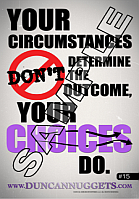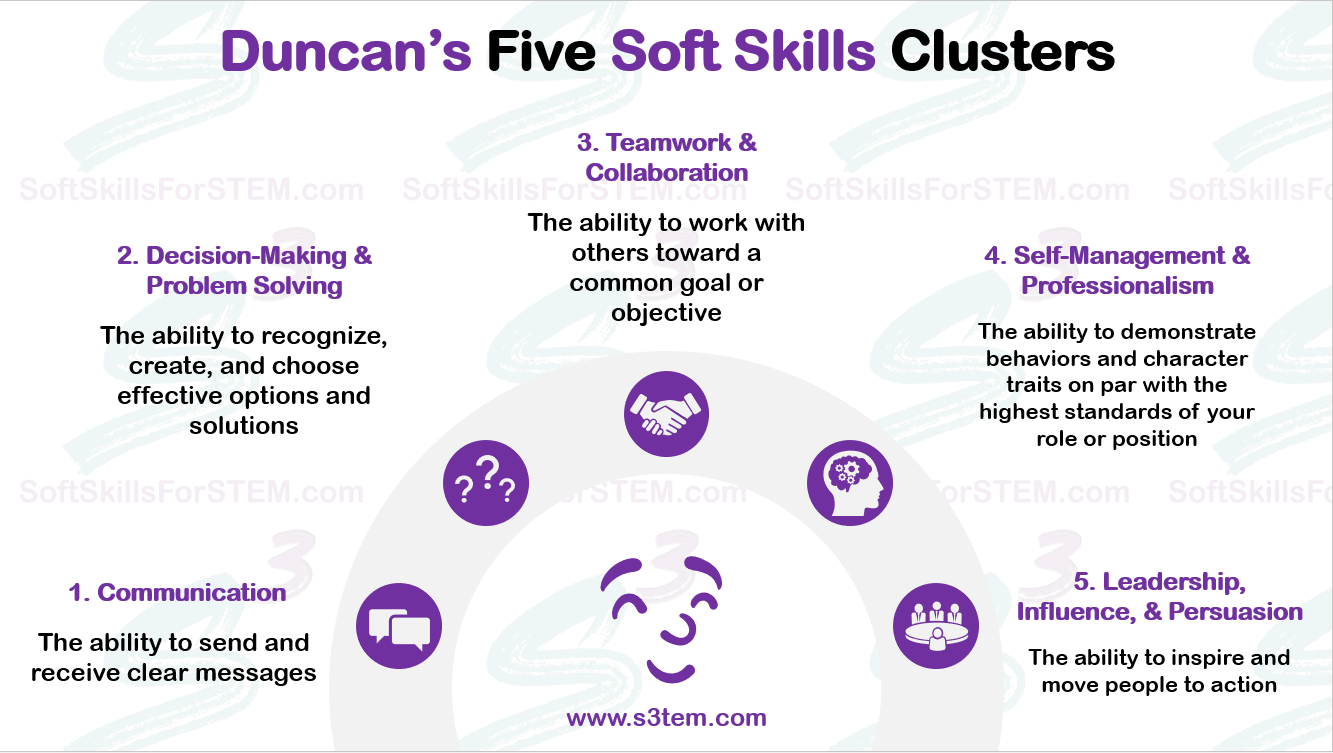Duncan Nugget® #34: Your Undivided Attention
If there is one thing that’s hard to give and even harder to get, it’s undivided attention.
It seems like there is barely enough time in the day to pay attention to your stuff, let alone somebody else’s, right? Well, guess what? Everybody feels the same way you do.
[VIDEO] Duncan Nugget® #350: What You Don’t Want
Your mind cannot directly process a negative.
When told not to do something, your mind has to picture doing it first before it can process not doing it. I’ll prove it to you.
Don’t think about your favorite color.
Don’t think about relaxing on the beach on a perfect day.
Don’t think about a pink elephant with blue polka dots and green wings.
Do you see what just happened? Even if it was only for a split second, you thought about each of those things because your mind processes information using images.
Since your unconscious mind does not distinguish between reality and imagination, if you are thinking “I don’t want to fail this test” then you briefly experience failing the test. Not cool.
Work on telling yourself (and other people) what you DO want.
Million-Dollar Question:
Are you focused on what you don’t want or what you DO want?
______________________
ACTION STEPS & DISCUSSION QUESTIONS
1. “I don’t want to fail this test” is an example of a goal that is focused on what you don’t want. Write this goal in positive terms so that it is focused on what you do want.
2. Write down 3 of your goals. Look carefully at the language you used to write them. Are you using positive or negative language? If any of your goals are written in negative terms, rewrite them in positive language that focuses on what you want.
3. What are some of the reasons and/or excuses that cause many people focus on what they don’t want? How do you or will you keep those reasons/excuses from having the same effect on you?

- Topics: Character DevelopmentDuncan NuggetsGoals & ProductivityPersonal DevelopmentProfessionalSelf-Awareness & PurposeTeenVideosYoung Adult
Duncan Nugget® #82: A Warped Sense of Reality?
Have you ever noticed that regardless of the problems or conflicts that show up in your life there is one thing that remains constant? There is one thing that is ALWAYS there.
YOU.
A vital component of effectively dealing with conflict, challenges, and difficult people is to be able to determine what YOU contributed to the situation. After all, anybody can be somebody’s difficult person. Think about that.
I know…I know. It’s not all your fault, right? Of course not, but it is your life. A lot of times conflicts are easier to resolve and problems are easier to solve when you start by looking in the mirror.
Accurate self-assessment is a powerful tool that keeps you from having a warped sense of reality. It helps facilitate change because when you change, things tend to change.
Million-Dollar Question:
What have you contributed to your current challenging situation?
Duncan Nugget® #59: From Wanting to Having
People spend a good deal of time—especially around the beginning of a new year—writing and talking about what they want. I guess that’s called goal-setting (wanting), but it’s not goal achievement (having).
- Topics: Character DevelopmentDuncan NuggetsGoals & ProductivityPersonal DevelopmentProfessionalTeenYoung Adult
Duncan Nugget® #52: Time to Do Something Different?
Self-motivation is crucial to achievement. But it will only last if you believe that there is a beneficial relationship between your behavior and your desired outcome.
Million-Dollar Question:
How does what you do in life help you to get what you want out of life?
If your answer is “it doesn’t” or “I don’t know” then why in the world are you doing it?! It’s your life, right? Maybe it’s time to do something different.
- Topics: Character DevelopmentDuncan NuggetsPersonal DevelopmentProfessionalSelf-Awareness & PurposeTeenYoung Adult
Duncan Nugget® #70: The Disappearance of Logic
When emotions fill the room, logic goes out the window.
Everybody has done or said something stupid in the heat of the moment. That’s because, regardless of the situation, the more emotional you become, the more information you ignore. Your limbic system (the emotional brain) takes the driver’s seat and steers you in a direction you may later regret.
Million-Dollar Question:
How do you get your emotions under
control during a peak emotional moment?
There’s no guaranteed trick that works for everybody, but here’s a nugget:
It takes 6-9 seconds for emotion-producing chemicals to flood your system. Giving yourself a ten count (if possible) before you take action will at least give you a chance to deal with the initial flood of emotions.
You don’t have to be a robot. Just chillax. Calm down a little. You will think more clearly and hopefully, your logic will reappear.
- Topics: Character DevelopmentDuncan NuggetsPersonal DevelopmentProfessionalSelf-Awareness & PurposeTeenYoung Adult
Duncan Nugget® #143: The Smell of Desperation
Desperation is unattractive. Period. I learned that the hard way. People can smell desperation from a mile away. It stinks of fear, low self-esteem, and hopelessness.
Why is she all up on him like that? She must be desperate.
Why is he acting like he’s going to die if I don’t buy this car? He’s desperate.
Why has he called me 198 times in the last hour? I just met him yesterday. Is he really that desperate?
Even if it is a desperate situation there’s no need for you to act desperate and hopeless.
Act like you know things will get better.
Act like you have an abundance mentality.
Act like you know that there is a power greater than you working on behalf of you.
Million-Dollar Question:
Do you smell like desperation?
- Topics: Character DevelopmentDuncan NuggetsGrit, Perseverance, DiligencePersonal DevelopmentProfessionalTeenYoung Adult












